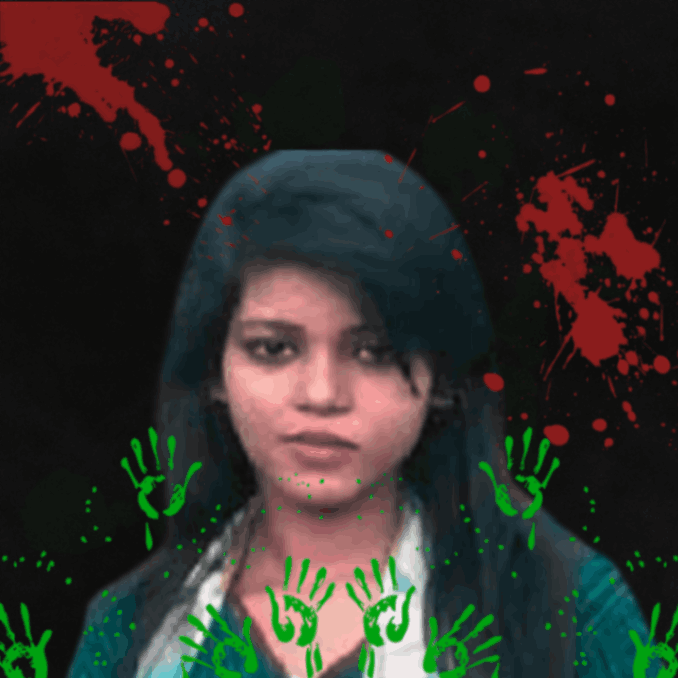Sitangshu Guha, May 21, 2024, New York: College student Tithi Sarkar has been sentenced to five years in prison for insulting Islam. Jamuna TV in Dhaka, Bangladesh reported on May 13, 2024, that Tithi made derogatory comments about the Prophet Muhammad on social media. Daily New Age reported on October 27, 2020, that Tithi Sarkar, a third-year student in the Zoology Department at Jagannath University (Dhaka), was suspended for making comments about Islam and Muhammad. Tithi, a former secretary of the University Rights Council and convener of the World Hindu Struggle Council, claimed that her Facebook account was hacked and she had filed a general diary (GD) at the police station regarding the matter. She was expelled from Jagannath University in October 2020. Earlier, the students had protested against Tithi. On May 13, 2024, Banglanews24 reported that Dhaka Cyber Tribunal Judge Zulfiqar Hayat sentenced the expelled Jagannath University student Tithi Sarkar to five years in prison. However, the court stipulated a set of rules, following which Tithi would not have to go to jail, if she agrees to that.
The Daily Star in Dhaka reported on January 4, 2023, that a Hindu youth named Rakesh Roy was sentenced to seven years in prison for blasphemy. On February 12, the same year, a court in Rangpur sentenced another Hindu youth, Paritosh Sarkar, to four different prison terms: one year, two years, three years, and five years, totaling eleven years. The court ordered that all sentences run concurrently, meaning Paritosh would serve five years. Jaijaidin reported on May 15, 2024, that a man named Badal Banik was beaten by a mob in Feni for insulting the Prophet. Shahidul Islam Chowdhury, the Officer-in-Charge of Feni Model Police Station, said that the police rescued Badal from the mob’s wrath and took him into custody. He is undergoing treatment at the hospital. Necessary legal action is being prepared following an investigation. However, Badal claimed that he did not insult the Prophet and that he was targeted due to previous enmity.
Another Dhaka daily Nayadiganta reported on May 15, 2024, that Comilla University (CoU) student Swapnil Mukherjee has been temporarily suspended on the recommendation of the proctorial body for insulting the Prophet and Islam. Acting Proctor Kazi Omar Siddiqui confirmed this to the media, stating that preliminary investigations proved the allegations of blasphemy. Students protested against Swapnil with human chains and demonstrations. Amar Sangbad media reported on May 2, 2024, that two Jagannath University students, Kawing Kein and Edison Dewan, were accused of making derogatory remarks about the Prophet Muhammad. Edison Dewan, a student in the Marketing Department, shared a video on a Facebook page named Buddhist Provard, where an Islamic cleric made derogatory remarks against Buddha. Kawing Kein commented on it using the name Muhammad, and Edison reacted with laughter. Kawing Kein claimed that he did not insult the Prophet, stating that he used the name Muhammad because he thought the cleric’s name was Muhammad, as Muslims often write Muhammad before their names.
The Daily Star reported on April 29, 2024, about the arrest of a Hindu youth for writing Lalon’s song on Facebook. The police released him after obtaining a bond following protests from the elite community. Weekly Blitz reported on May 5, 2024, that Sharia Bank funds in Bangladesh are being used for love jihad. The Vorer Kagoj newspaper headlined: “Unity Council and Puja Council Concerned: Love Traps for Converting Hindu Women.” On April 10, VDO reported that a madrasa teacher named Faisal Karim Reza was arrested for vandalizing idols at a Kali temple of Sanatan followers in Bogra.Somoy TV reported on April 27, 2024, that cricketers refused to play under a female umpire in the Dhaka Premier League.
These incidents have recently appeared in the media. Are all these incidents interconnected, or are they isolated incidents as always claimed by the administration or leaders? Under the Digital Security Act which is now Cyber Security Act, hundreds of Hindu students and teachers in Bangladesh are suffering from social and state retaliation, some serving prison sentences, some detained without trial, some on the run. It is worth noting that Hindus in Bangladesh never insult Islam or Muhammad. They always face humiliation, discrimination, oppression, and live in fear that any time anyone can do anything harm to them. They know that insulting Islam or Muhammad will come with jail, beating, persecution and even death, why they will dare to invite trouble for themselves? The reality is that a certain group often uses this weapon (Insult of Islam and Muhammed) against Hindus. The administration and the state machinery prefers to remain silent and/or look otherwise.
Hindus in Bangladesh do not throw stones at mosques, yet attacks on temples and idol-breaking incidents are routine and happening almost everyday day. Clerics in their sermons continue to make enticing falsehoods about Hindu deities more than explaining their religion Islam. No one is watching! The Digital Security Act or Cyber Security Act is being used against Hindus as a substitute to blasphemy law. Clerics are not being caught. It seems that in Bangladesh only the majority (Muslims) have extensive religious sentiments, while others (non-Muslims) does not have that, they should not have that or their feelings have become numb. The question arises, is religion (Islam) is so fragile that the entire administration has to jump against a college girl, Tithi Sarkar, on what she said? Many speak against Jesus in Western countries. Hindus in India speak against their God/Goddess, but others does not jump on them in retaliation, does it mean they have no feelings? No it’s not, they are tolerant and believes in ‘Free speech’. But why all the so-called feelings are within the Bangladesh’s majority Muslim community, why they do not tolerate anything? Because of this sentiment the condition of the Hindus and other religious minorities in Bangladesh are like, “Chere thee maa Kaneda bachi” meaning “we don’t want anything from you, just let us cry and survive.” Unfortunately there seems to be no immediate solution to this problem.
(The Bengali version of it was published in the weekly Jonmobhumi, New York on 23rd May 2024).




































